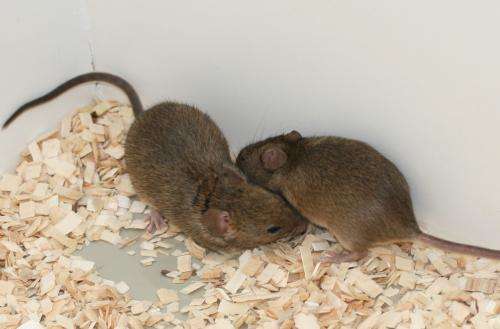Sexual selection enhances ability of offspring to cope with infection

Offspring from female mice who mate with their preferred male are better able to cope with an experimental infection compared to those of females mated with non-preferred males, according to new results published today. The findings by scientists at the Konrad Lorenz Institute of Ethology at the Vetmeduni Vienna have been published in the open access journal BMC Evolutionary Biology.
To test whether female mate choice enhances the health and disease-resistance of offspring, either through immune resistance, tolerance to infection, or both, researchers led by Dustin Penn tested female house mice's preferences (Mus musculus) for particular males and then experimentally assigned each female to mate with either their preferred or their non-preferred male. They found that females that mated with their preferred male produced more offspring and were better able to cope with infection (from Salmonella, a common mouse pathogen) compared to offspring sired by non-preferred males. They were no better at controlling pathogen loads than offspring from non-preferred males, which suggests that the fitness benefits were due to tolerance to infection rather than immune resistance (the ability to control or eliminate pathogens) per se.
In 1982, Hamilton and Zuk suggested that mate choice enables females to select healthy, disease-resistant males, and produce disease-resistant offspring. Since then many studies have confirmed that showy secondary sexual traits provide information about males' immune resistance and parasite loads, and females are more attracted to healthy males. Doubts have remained about the hypothesis, however, partly because studies so far have mainly measured disease-resistance indirectly, assessing parasite loads or immune responses to antigens, which do not necessarily reflect health and disease-resistance.
This study provides direct experimental evidence that females' partner preferences enhance the ability of offspring to cope with infection in house mice. The authors suggest that females assess males' overall condition and health rather than immune resistance per se, and for this reason, sexual selection should enhance offspring tolerance, as well as immune resistance to infection. Penn and others have shown that ability to resist and survive Salmonella infection is influenced by MHC genes and other loci. However, he emphasizes that they still need to determine whether the fitness benefits they found were due to genetics or maternal allocation into preferred offspring, and that either mechanism will be interesting to explore in future studies.
Shirley Raveh, the lead author of the paper said she was "quite surprised by their findings. If there are indirect benefits from sexual selection, they would have been for improved immune resistance." She explains that she hopes their findings will stimulate renewed interest in parasite-mediated sexual selection, along with the rapidly growing interest in tolerance to infection.
More information: "Female partner preferences enhance offspring ability to survive an infection." Shirley Raveh, Sanja Sutalo, Kerstin E Thonhauser, Michaela Thoß, Attila Hettyey, Friederike Winkelser and Dustin J Penn. BMC Evolutionary Biology 2014, 14:14 DOI: 10.1186/1471-2148-14-14
Journal information: BMC Evolutionary Biology
Provided by University of Veterinary Medicine -- Vienna


















